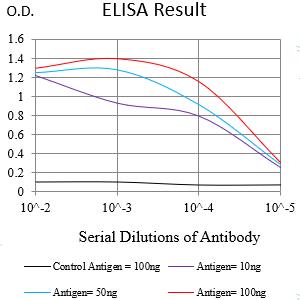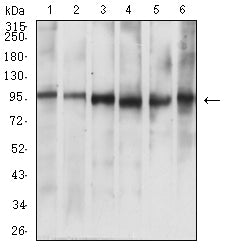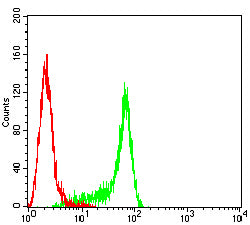


| WB | 1/500 - 1/2000 | Human, Monkey |
| IF | 咨询技术 | Human, Monkey |
| IHC | 咨询技术 | Human, Monkey |
| ICC | 技术咨询 | Human, Monkey |
| FCM | 1/200 - 1/400 | Human, Monkey |
| Elisa | 1/10000 | Human, Monkey |
| Aliases | ADIR2; NUP96; NUP196; Nup98-96 |
| Entrez GeneID | 4928 |
| clone | 2F5H8 |
| WB Predicted band size | 197.5kDa |
| Host/Isotype | Mouse IgG1 |
| Antibody Type | Primary antibody |
| Storage | Store at 4°C short term. Aliquot and store at -20°C long term. Avoid freeze/thaw cycles. |
| Species Reactivity | Human, Monkey |
| Immunogen | Purified recombinant fragment of human NUP98 (AA: 1-218) expressed in E. Coli. |
| Formulation | Purified antibody in PBS with 0.05% sodium azide |
+ +
以下是关于NUP98抗体的3篇参考文献,涵盖其应用及研究背景:
---
1. **文献名称**:*NUP98-HOXA9 induces long-term proliferation and blocks differentiation of primary human CD34+ hematopoietic cells*
**作者**:Takeda A, et al.
**摘要**:研究利用NUP98抗体检测NUP98-HOXA9融合蛋白在造血干细胞中的表达,发现其通过阻断细胞分化驱动白血病发生,抗体用于Western blot和免疫荧光验证融合蛋白定位。
2. **文献名称**:*The role of NUP98 in nuclear pore complex assembly and leukemogenesis*
**作者**:Xu S, Powers MA.
**摘要**:通过NUP98抗体进行免疫共沉淀和质谱分析,揭示NUP98在核孔复合体形成中的作用,并探讨其突变导致白血病的分子机制。
3. **文献名称**:*Detection of NUP98 rearrangements in AML using a novel antibody-based assay*
**作者**:Gough SM, et al.
**摘要**:开发基于NUP98抗体的临床检测方法,用于急性髓系白血病(AML)样本中NUP98融合基因的快速筛查,验证其敏感性和特异性。
---
以上研究均涉及NUP98抗体的实验应用(如蛋白检测、定位分析及临床诊断),支持其在白血病机制和核孔功能研究中的关键作用。
NUP98 (Nucleoporin 98) is a critical component of the nuclear pore complex (NPC), which regulates nucleocytoplasmic transport of RNA and proteins. It plays roles in gene expression, chromatin organization, and cell cycle progression. The NUP98 gene is frequently implicated in chromosomal translocations associated with acute leukemias, particularly acute myeloid leukemia (AML) and T-cell acute lymphoblastic leukemia (T-ALL). These translocations generate fusion oncoproteins (e.g., NUP98-HOXA9. NUP98-NSD1) that disrupt hematopoietic differentiation and promote leukemogenesis.
NUP98 antibodies are essential tools for studying its expression, localization, and interactions in normal and diseased states. They are widely used in techniques like immunohistochemistry (IHC), Western blotting, immunofluorescence (IF), and co-immunoprecipitation (Co-IP) to investigate NPC architecture, fusion protein dynamics, and leukemia-related mechanisms. Specific antibodies can distinguish wild-type NUP98 from fusion variants, aiding in diagnostics and research on translocation-driven malignancies.
Clinically, detecting NUP98 rearrangements or aberrant expression has prognostic significance, as certain fusions correlate with aggressive disease or chemotherapy resistance. Research using NUP98 antibodies continues to unravel its roles in oncogenesis, RNA export, and chromatin regulation, offering potential therapeutic targets. These antibodies also contribute to understanding NPC dysfunction in rare genetic disorders and viral infections that exploit nucleoporins for replication.
×